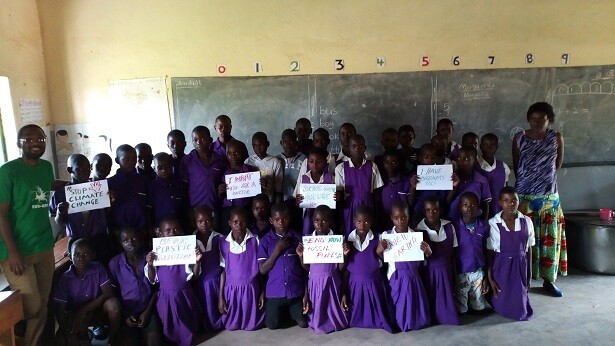
Driven by a passion for the environment, each school term on Tuesdays and Thursdays, climate campaigner Steven Makumba conducts sessions on environmental conservation at a school in Malawi’s leading tobacco producing district, Kasungu.
On one sunny Tuesday afternoon we arrived in Kasungu and Makumba was within the estimated arrival time. His top-of-range machine was now eating the remaining distance at a snail’s pace as he enjoyed the fascinating expanse of landscape stretched out before him. The sweet chirp and twitter of song-birds as he rattled along Kasungu Prison heading to Mangwazo were as soothing as they could be.

Makumba’s sessions at Kandoweke Primary School starts at 2:30PM where he equips learners with information on climate Change, plastic pollution, waste management and organic farming knowledge.
“Welcome visitors!” he mumbled, his face alight with positive anticipation. Looking far-off, Chitete Village is still covered in a canopy of evergreens on her cascading hills and along the meandering river. Time stood still in some of these places.
Steven shares, “So far through NatureKit, a Youth Based Non-Governmental Organisation I founded in 2016, I am working with 6 primary schools with two main pilot sites.
“Am offering support to 565 learners and 25 communities in environmental management. I want to be part of the solution ending atrocities caused by human actions onto the environment where in most cases women and children are bearers of negative blunts”, laments Steven.
“In Malawi, a lot of people are illiterate on issues regarding environmental conservation, there is a lot to be done so that we can create a new chapter”, Steven says.
“I feel glad that I have contributed to the war on climate change and the war is not over. I have been able to educate and train learners to truly understand what Climate Change is and what the future holds,” he explains.
Floods
In Nsanje, Bernadette will never forget the day her whole village was flooded. Heavy rains poured without ceasing for more than 6 days, with extreme winds being too much for her house to withstand washing away their belongings inclusive farmlands.
There was no time to gather her household items as she and her 6 children rushed in the dark and through rising water as they navigated to higher ground.
It has been two months since the floods hit, and Bernadette speaks with an air of hope as flood waters receded, roads and bridges are being repaired, traders are reopening their shops, and livestock are grazing again.
But for Bernadette and thousands of other people, the possibility of immediately recovering from the effects of Cyclone Idai is still low, specifically for those whose houses were destroyed.
According to figures by Malawi – United Nations Development Programme (UNDP), in early March, a severe weather system formed off the eastern coast of Mozambique and hit Malawi with heavy rain and strong winds before moving back to the Mozambique Channel where it intensified into Cyclone Idai and hit Malawi a second time.
More than 865,000 people were affected, including more than 86,980 displaced, with 59 deaths and 672 injuries recorded, according to the Government. In total, 15 districts and 2 cities impacted, with the 7 districts of Nsanje, Phalombe, Chikwawa, Mangochi, Balaka, Chiradzulu, and Zomba hardest hit.
Based on Malawi’s Flood Response Plan, a coordinated emergency response is underway by the Government of Malawi, its UN partners, and NGOs to address immediate needs, particularly relating to water and sanitation, essential medicines and food assistance. Ms. Claire Medina, interim UNDP Resident Representative, noted.
Clean energy prospect
According to Mbaula secretariat coordinator Mbumba Chigalu, the country is not on course to achieve the two Million by 2020 ambitious dream.
Moreover, only 1 in every 100 people is connected to the grid use electricity for cooking leaving forests under fire, with almost 98 percent of the population depending on firewood and charcoal.














